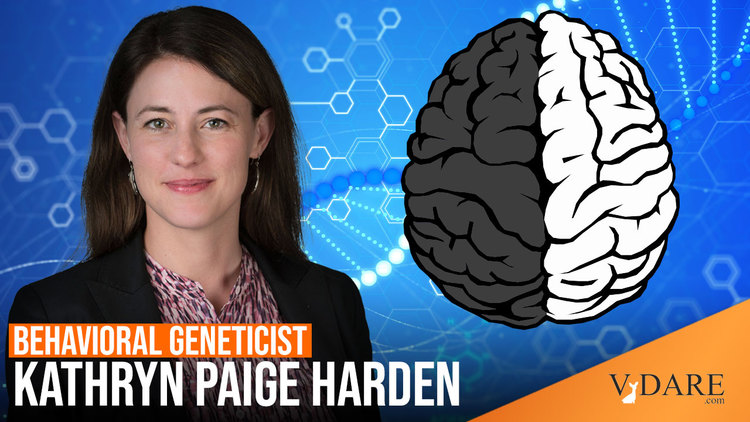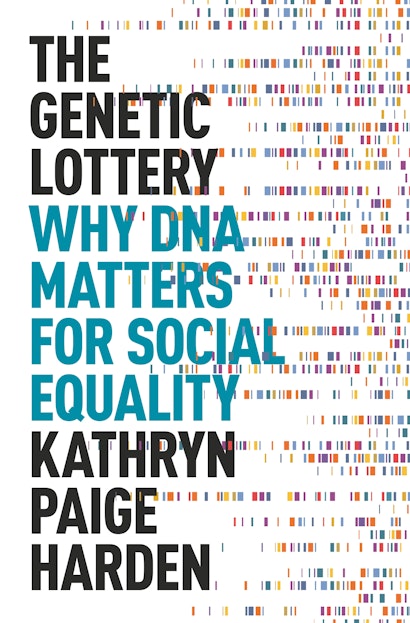


By Jared Taylor
09/09/2021
The evidence that genes influence intelligence and other personality traits is so overwhelming that even a few lefties no longer deny it. But, oh, how they agonize over how to reconcile science with the religion of equality. How do you justify massive social intervention when the people you are trying to help might not be victims of racism or sexism or capitalism? What if at least part of the problem is that they were born stupid or lazy?
I’ve been saying for years that the people who tax us and boss us around in the name of equality won’t stop taxing us and bossing us around just because it turns out that unsuccessful people got a bad roll of the genetic dice. But handout programs will be a harder sell, and “progressives” will have to give up one of their great joys in life: the conviction that they are morally superior to the “racists” and “conservatives” whom they blame for the problems they think they are solving.
The latest issue of the New Yorker devotes one of its bloated articles to just such a case of leftist agony. It’s called “Can Progressives be Convinced that Genetics Matters?” It should be astonishing that anyone needs to be convinced that genetics matter, but we live in an age of resolute ignorance.
The geneticist Kathryn Paige Harden is at the forefront of a new movement, sometimes referred to as the “hereditarian left,” dedicated to the development of a new moral framework for talking about genetics. https://t.co/0hgWw8WIFS
— The New Yorker (@NewYorker) September 7, 2021
The hero of the article is a young academic super-star lefty named Kathryn Paige Harden [Tweet her] who, the New Yorker says, is almost single-handedly fighting a two-front war: “on her left are those who assume that genes are irrelevant, on her right those who insist that they’re everything.” No one — and I mean no one — thinks genes are “everything,” but that is the pose lefties strike. They believe only committed progressives can truly understand the policy implications of genetics.
 Kathryn Paige Harden
Kathryn Paige Harden
As Prof. Harden, who became tenured in psychology at UT Austin at age 32, explains, “There is a middle ground between ‘let’s never talk about genes and pretend cognitive ability doesn’t exist’ and ‘let’s just ask some questions that pander to a virulent on-line community populated by racists with swastikas in their Twitter bios.’ “ There’s that phony dichotomy again. And who is enemy number one in this “virulent on-line community”? Your servant.
First, let us praise Prof. Harden. For an academic, it is risky to say such things as, “If people are born with different genes, if the genetic Powerball lands on a different polygenic combination, then they differ not just in their height but also in their wealth.” Even to hint that being poor might have something to do with genes — that it isn’t exclusively the fault of the cis-gendered white-supremacist hetero-normative xenophobic patriarchy — is heresy. This is just as bad: “Common intuitions about the scale of inequality in our society, and our imaginations about how much progress we would make if we eliminated the visible inequalities by race and class, are profoundly wrong.” Setting aside how common that intuition is outside cozy elite circles, this sort of thing threatens to bring down the whole social-justice house of cards. And lefties know it.
Indeed, this seems to have been what caused one of the first bumps in Prof. Harden’s otherwise charmed career. During the 2015–16 academic year, still just 32 years old, she was scholar-in-residence at the Russell Sage Foundation in New York. The foundation is a nest of progressives who, writes the New Yorker, “seemed certain that behavior-genetics research, no matter how well intentioned, was likely to lead us down the garden path to eugenics. The world would be better, Harden was told, if she quit.”
Prof. Harden was naïve enough to think that this sort of talk “was the vestige of a bygone era” and that “her critics might be reassured by updated information.” She sent them a study of polygenic scores (see here for what that means) that found genetic patterns that could partly explain individual differences in reading ability and years of schooling. “Hope that you find this interesting food for thought,” she wrote cheerily.
Instead, William Darity, who teaches public policy at Duke, lead the attack: “There will be no reason to pursue these types of research programs at all, and they can be rendered to the same location as Holocaust denial research.” In further correspondence, he added that “I feel just as strongly that we should not keep the notions that the world is 6000 years old or that climate change is a fabrication under consideration.”
The New Yorker explains that Prof. Darity is “perhaps the country’s leading scholar on the economics of racial inequality” and a booming voice for reparations for slavery. No wonder he wants to treat behavior genetics as if it were Holocaust denial. If genes account for even just a few points of the black/white IQ gap, it might spoil his calculations of how many trillions we owe blacks.

William Darity
What the New Yorker fails to mention is that Prof. Darity is black, so a young, lefty “Karen” dared not brush him off as an ignoramus, especially since, as the article notes, she is “otherwise in near-total political agreement” with him. The wounded Prof. Harden “has spent the last five years thinking about Darity’s objections,” but she has not surrendered. In the meantime, she had to fend off another black attacker, Dorothy Roberts, professor of Africana studies at Penn, who says that the only result of recognizing genetic contributions to behavior is a compulsion to “stigmatize, control, and punish.”
This March, Prof. Harden said she favored standardized testing because it predicts college performance better than GPA does. She might as well have hoisted the Nazi flag. Someone started a parody Twitter account called “Dr. Harden, Social Justice Through Eugenics!” and others said she was encouraging “the alt-right.”
Needless to say, Prof. Harden insists that although genes tell us something about differences within groups, they tell us nothing about differences between groups — and, no doubt, never will. Alas, her old nemesis Prof. Darity says that to assert the one but deny the other is “a feint and a dodge,” whereupon the New Yorker introduces your servant:
There is a good precedent for this kind of concern. In “Blueprint,” Robert Plomin wrote that polygenic scores should be understood as “fortune tellers” that can “foretell our futures from birth.” Jared Taylor, a white-supremacist leader, argued that Plomin’s book should “destroy the basis for the entire egalitarian enterprise of the last 60 or so years.” He seized on Plomin’s claim that, for many outcomes, “environmental levers for change are not within our grasp.” Taylor wrote, “This is a devastating finding for the armies of academics and uplift artists who think every difference in outcome is society’s fault.” He continued, “And, although Blueprint includes nothing about race, the implications for ‘racial justice’ are just as colossal” [Blueprint: How DNA Makes Us Who We Are, American Renaissance, January 4, 2019, Citation Added].
I’m amused to find that I, an alleged “white supremacist leader,” am in such intimate agreement with a leading reparations advocate on the question of recognizing genetic influence.
The New Yorker then turns into a promo piece for Prof. Harden’s forthcoming book, The Genetic Lottery. The publisher didn’t send me an advance copy, so I don’t know what’s in it, but I can guess. After many pages of pouring self-righteous scorn on racists and sexists and telling us Hitler was a very bad man, she will try to persuade her fellow progressives to understand that we are all born different, and that genes matter. She will ask them to consider that it might just perhaps possibly be true that some people might just perhaps possibly be born stupid and lazy, and that this might just perhaps possibly explain why they are poor or in jail. But, she will hasten to add, progressives can still be the moral heroes of our era and must never abandon the crusade for equality.
There are two reasons for this. First, ragpickers and jailbirds were genetically unlucky, so degeneracy is no more their fault than if white silence really were violence; so they are just as deserving as ever. Second, lefty professors and soccer moms were genetically lucky. They have to give up the myth, as Prof. Harden says, that “those of us who have ‘succeeded’ in twenty-first century capitalism have done so primarily because of our own hard work and effort.”

As The Genetic Lottery’s cover proclaims, the book will explain “how the science of genetics can help create a more just and equal society.” Since it’s all a matter of luck, the lucky few should be just as devoted as ever to succoring the unlucky many. Redistribution must go on. Besides, Prof. Harden will cheerfully add, the more we know about genetics, the more we can tune our uplift efforts to things that really work — she’s sure to know what they are. And she will end with mighty blasts against the savage racists and sexists of the past and against the perverts of the present like your servant who think that an understanding of genetics implies a few policy changes she wouldn’t like.
This is the sort of fluff with which liberals (and even conservatives) must sugar the pill, and all snideness aside, I’m very glad Prof. Harden wrote a book that could prompt more accusations that she is lending comfort to the alt-right.
I must even give the New Yorker some credit. For a drearily predictable, self-righteous, Trump-hating magazine to make a hero out of a behavioral geneticist is a surprise. Her BIPOC foil, the reparations-pushing William Darity, comes off as a bigoted bully. The mainstream media do have occasional spasms of this kind, but then go right back to peddling nonsense.
And yet, for how long can the holy crusade of redistribution survive an understanding of genetics?
The urge to be a ministering angel is certainly strong. Prof. Harden calls herself a “Matthew 25:40 empiricist” (“And the King shall answer, … inasmuch as ye have done it unto one of the least of these my brethren, ye have done it unto me”). Today, one of the obligatory marks of virtue is to profess, as loudly as possible, the goal of equality, and to care equally loudly about blacks, winos, immigrants, transsexuals, etc. Virtue doesn’t require actually doing anything to help them other than voting Democrat, but if America has one top-priority goal, it’s equality.
At the same time, surely, much of the thrill of being on the Left is an intoxicating sense of moral superiority, the joy of inventing endless pathologies — racist, sexist, xenophobe, etc. — with which to diagnose conservatives. The entire vocabulary of the Left is Manichean. For there to be “the marginalized,” there must be bad people shoving them into the margins. There are “the underserved” only because the same bad people refuse to serve them. No one would be “downtrodden” if those bad people weren’t trampling them. And, of course, we know who those bad people are. What fun it must be to believe that one’s opponents are depraved.
But what if Prof. Harden is right and America is not so much a crime scene as a story of good luck and bad luck? Could the Left keep pushing the juggernaut without its daily — hourly — cocaine fix of moral outrage? I doubt it. There’s such joy in dragging down the white man.
Let’s imagine explaining to white suburban mothers why there has be Section 8 housing in their neighborhood:
Yes, these people live in tar-paper shacks because they’re shiftless, but the poor dears were born that way and can’t help it. You live in nice houses because you are smart and hard-working but you were born that way so you can’t help it. And, yes, they will bring crime, but they can’t help that either.
If that’s the best the Left can do, there won’t be any Section 8 housing. Or affirmative action or reparations or critical race theory or immigrant-coddling or diversity boosting or any of the other dead weights progressives hang around our necks.
And, of course, there will be eugenicist rumblings. If people are born feckless and are likely to have feckless children, how about making Norplant a condition for getting welfare?
Prof. William Darity is right to screech. For him and for the entire Left, “gene” is a four-letter word. Their paychecks, their identities, their zest for life all go up in smoke if the problem is nature and not white supremacy.
I wish Prof. Harden every success with her book. Even if she assures lefties they can still feel self-righteous, it will take high-wire oratory to convince them to give up cherished illusions. And who knows? Maybe The Genetic Lottery will make it a little less likely we get idiotic laws such as No Child Left Behind or that we try to turn Afghans into Hubert Humphrey Democrats. We may still lather Quanisha and Juan Pablo with preferences, but the frenzy to make them into doctors and jet pilots may cool. In the long term, the relentless levelling of the last century will not survive widespread understanding of how genes shape behavior.
How long will the long term be? Thirteen years ago, I wrote about dissention in the ranks:
As the number of heretics grows, a few of the less blinkered liberals can see that the egalitarian edifice is shaky. They don’t want to be the last defenders of what may be a doomed orthodoxy … . Their vanity tells them that the last to abandon ship will look ridiculous. In retrospect, everyone will see there was not one scrap of positive evidence for egalitarian orthodoxy. But when will it be safe to jump? Who will later be heralded as far-seeing, and who will be put to the stake? The defenders of orthodoxy are still powerful, and desperation makes them vindictive.
Equality has been the main goal in America for so long that people can’t imagine anything else. I can. A society could strive for excellence, integrity, and honor just as mightily as ours strives for equality. I believe that society will come one day; I hope I live to see it.
Jared Taylor is the editor of American Renaissance. You can follow him on Parler and Gab.